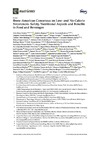Please use this identifier to cite or link to this item:
https://accedacris.ulpgc.es/jspui/handle/10553/42388
| Title: | Ibero-American consensus on low- and no-calorie sweeteners: safety, nutritional aspects and benefits in food and beverages | Authors: | Serra-Majem, Lluis Raposo, Antonio Aranceta Bartrina, Javier Varela-Moreiras, Gregorio Logue, Caomhan Laviada, Hugo Socolovsky, Susana Perez-Rodrigo, Carmen Antonio Aldrete-Velasco, Jorge Meneses Sierra, Eduardo Lopez-Garcia, Rebeca Ortiz-Andrellucchi, Adriana Gomez-Candela, Carmen Abreu, Rodrigo Alexanderson, Erick Joel Alvarez-Alvarez, Rolando Alvarez Falcon, Ana Luisa Anadon, Arturo Bellisle, France Alejandra Beristain-Navarrete, Ina Blasco Redondo, Raquel Bochicchio, Tommaso Camolas, Jose Cardini, Fernando G. Carocho, Marcio Costa, Maria do Ceu Drewnowski, Adam Duran, Samuel Faundes, Victor Fernandez-Condori, Roxana Garcia-Luna, Pedro P. Carlos Garnica, Juan Gonzalez-Gross, Marcela La Vecchia, Carlo Leis, Rosaura Maria Lopez-Sobaler, Ana Agustin Madero, Miguel Marcos, Ascension Mariscal Ramirez, Luis Alfonso Martyn, Danika M. Mistura, Lorenza Moreno Rojas, Rafael Moreno Villares, Jose Manuel Antonio Nino-Cruz, Jose Oliveira, Maria Beatriz P. P. Palacios Gil-Antunano, Nieves Perez-Castells, Lucia Ribas-Barba, Lourdes Rincon Pedrero, Rodolfo Riobo, Pilar Rivera Medina, Juan Tinoco de Faria, Catarina Valdes-Ramos, Roxana Vasco, Elsa Wac, Sandra N. Wakida, Guillermo Wanden-Berghe, Carmina Xochihua Diaz, Luis Zuniga-Guajardo, Sergio Pyrogianni, Vasiliki Velho de Sousa, Sergio Cunha |
UNESCO Clasification: | 3206 Ciencias de la nutrición | Keywords: | Non-nutritive sweeteners Low-calorie sweeteners Sweeteners Ibero-American Safety, et al |
Issue Date: | 2018 | Publisher: | 2072-6643 | Journal: | Nutrients | Abstract: | International scientific experts in food, nutrition, dietetics, endocrinology, physical activity, paediatrics, nursing, toxicology and public health met in Lisbon on 2-4 July 2017 to develop a Consensus on the use of low- and no-calorie sweeteners (LNCS) as substitutes for sugars and other caloric sweeteners. LNCS are food additives that are broadly used as sugar substitutes to sweeten foods and beverages with the addition of fewer or no calories. They are also used in medicines, health-care products, such as toothpaste, and food supplements. The goal of this Consensus was to provide a useful, evidence-based, point of reference to assist in efforts to reduce free sugars consumption in line with current international public health recommendations. Participating experts in the Lisbon Consensus analysed and evaluated the evidence in relation to the role of LNCS in food safety, their regulation and the nutritional and dietary aspects of their use in foods and beverages. The conclusions of this Consensus were: (1) LNCS are some of the most extensively evaluated dietary constituents, and their safety has been reviewed and confirmed by regulatory bodies globally including the World Health Organisation, the US Food and Drug Administration and the European Food Safety Authority; (2) Consumer education, which is based on the most robust scientific evidence and regulatory processes, on the use of products containing LNCS should be strengthened in a comprehensive and objective way; (3) The use of LNCS in weight reduction programmes that involve replacing caloric sweeteners with LNCS in the context of structured diet plans may favour sustainable weight reduction. Furthermore, their use in diabetes management programmes may contribute to a better glycaemic control in patients, albeit with modest results. LNCS also provide dental health benefits when used in place of free sugars; (4) It is proposed that foods and beverages with LNCS could be included in dietary guidelines as alternative options to products sweetened with free sugars; (5) Continued education of health professionals is required, since they are a key source of information on issues related to food and health for both the general population and patients. With this in mind, the publication of position statements and consensus documents in the academic literature are extremely desirable. | URI: | https://accedacris.ulpgc.es/handle/10553/42388 | ISSN: | 2072-6643 | DOI: | 10.3390/nu10070818 | Source: | Nutrients [ISSN 2072-6643],v. 10 (7), (Julio 2018) |
| Appears in Collections: | Artículos |
Items in accedaCRIS are protected by copyright, with all rights reserved, unless otherwise indicated.
